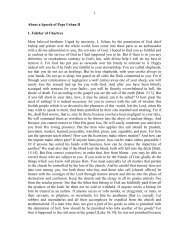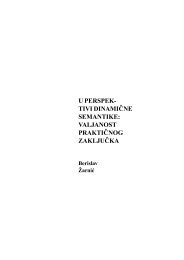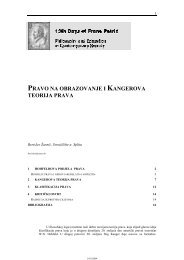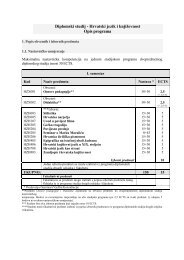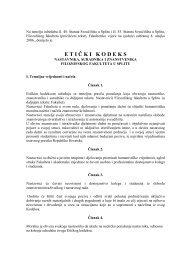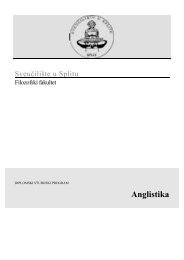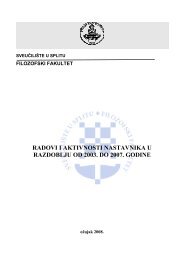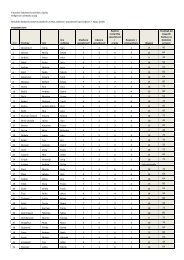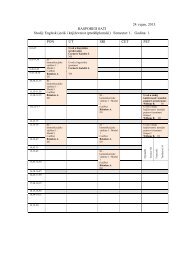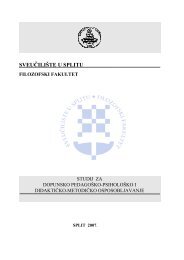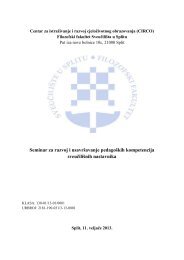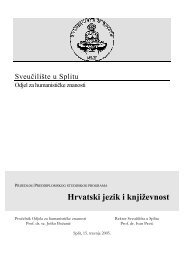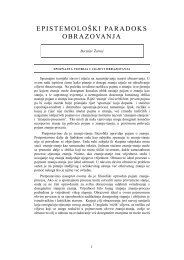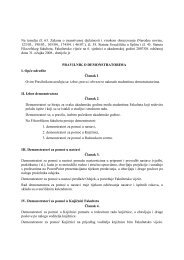English Studies
English Studies
English Studies
Create successful ePaper yourself
Turn your PDF publications into a flip-book with our unique Google optimized e-Paper software.
G R A D U A T E D E G R E E P R O G R A M M E : E N G L I S H S T U D I E S<br />
Type of course<br />
Level of course<br />
Seminar / Advisory hours<br />
Elective course<br />
Advanced<br />
Year of study First Semester Two and/or Three<br />
ECTS<br />
(Number of<br />
credits allocated)<br />
Name of lecturer<br />
Learning<br />
outcomes and<br />
competences<br />
3 ECTS<br />
Contact hours (25 seminars + 5 advisory hours) = 0.75 credits.<br />
Student study time (67.5 hours) = 2.25 credits.<br />
Simon Ryle, MA, Assistant<br />
Students will improve their knowledge of poetic and prose fiction forms of<br />
<strong>English</strong>.<br />
By attention to the concentrated web of referential signs employed in poetic<br />
and fictive forms of <strong>English</strong>, students will improve their ability to use<br />
precisely and effectively these forms.<br />
Students will develop subtle critical faculties with regard to the aesthetic<br />
and technical aspects of poetic and prose fiction forms of <strong>English</strong>, and<br />
acquire appropriate techniques of applying critical commentary to poetic<br />
and fictive forms of <strong>English</strong> produced by their peers.<br />
Prerequisites Completion of the third year undergraduate study programme.<br />
Overall <strong>English</strong> language competence at C2 level. Adequate motivation.<br />
Course contents As classes will be a workshop-style discussion of student-produced creative<br />
work, the course contents will have to adapt in exact formulation to the<br />
specific requirements of this student creative work. A certain flexibility will<br />
be required in critical sessions — to understand the goals of a text, and<br />
apply its own internal laws to its evaluation. Critical discussion will centre<br />
on technical and aesthetic aspects of the writing process, rather than<br />
questions of genre and issues of literary criticism.<br />
In poetry sessions, students will be asked to consider, over rhythm and<br />
rhyme schemes, the descriptive and emotive power and subtlety of the<br />
images they construct, the exact expression of the interweaving of narrative,<br />
sensory, and emotional motifs. The concentration and precision of poetical<br />
language will be emphasised.<br />
In prose fiction sessions, students will be asked to consider the concise<br />
building of a world in cogently applied details, the subtle psychological<br />
construction of protagonist and supporting cast, the non-sensational (unless<br />
this works as conscious feature of the piece) invention and laying-out of<br />
plot, and the pace and tone of narrative voice.<br />
An example of a technical concern could be the application of metaphor: the<br />
need for precision and the balanced consistency of subsequent metaphorical<br />
expressions will be emphasised. Students will be expected to avoid clichés<br />
and hackneyed, tired uses of metaphorical language, to reformulate and look<br />
for new ways of saying. Critical awareness of this will be introduced in<br />
seminar discussions of illustrative texts, and students will be expected to<br />
later apply such ideas flexibly and naturally during the discussion of peer<br />
work.<br />
31



